ICT Division
Deal signed to set up 'Made in Bangladesh Cloud' data centre
The Bangladesh Data Center Company of the ICT Division and Gennext Technology Thursday (December 29, 2022) signed an agreement to set up a "Made in Bangladesh Cloud" data centre.
Bangladesh Data Center Company Managing Director Abu Sayeed Chowdhury and Gennext Technology Chairman Touhidul Islam inked the deal.
Read more: Colocity brings Microsoft Azure stack hub hybrid cloud to Bangladesh
The "Meghna Cloud" data centre will be built using the technology and human resources of Bangladesh.
The centre will help Bangladesh save foreign currency for the use and purchase of cloud technology. It will also be able to serve private and public organisations while keeping data within the country.
Read More: Top 10 Most Exciting Innovations of 2022 in Technology
3 years ago
A2I observes Era of Digital Centres
Access to Information (A2I) under Cabinet and ICT divisions in cooperation with UNDP observed an era of providing services to citizens through digital centres on Friday.
A programme was organised marking the era anniversary where State Minister for ICT Zunaid Ahmed Palak was present in the capital, as the chief guest.
ICT division’s Senior Secretary NM Ziaul Alam and Local Government division’s Additional Secretary Dr Muhammad Sher Ali were present as special guests at the function with A2I Project’s Director Dr Dewan Muhammad Humayun Kabir in the chair.
Read more: Digital Bangladesh: World’s 7th largest data centre eyes foreign currency
State Minister Palak said entrepreneurs of the country’s digital centres will be made smart entrepreneurs to turn Bangladesh into a smarter one from digital by 2041.
“For that online and offline trainings for entrepreneurs of digital centres across the country will be arranged,” he said, adding that one each digital centre will be set up in 87, 000 villages in the country.
To convey digital services to people’s door-steps, one each digital centre will be set up within the distance of every two kilometers instead of now five kilometers, he said.
The state minister also said special training and internship on skill development will be arranged for women entrepreneurs to convey unique services through the digital centres.
Read more: Digital centres to transform villages into cities: LGRD Minister
will also be taken to turn every digital centre into a rural economic hub through a participatory environment among men and women, he said.Along with the central function, several programmes were also organised marking the era anniversary in every district, upazila and union across the country with the campaign ‘Smart Bangladesh 2041: Smart services for all’.
3 years ago
ICT Division defends move to list Critical Information Infrastructure
The Information and Communication Technology (ICT) Division has recently listed 29 government institutions as Critical Information Infrastructure (CII), leaving them beyond the purview of certain clauses of the Right to Information Act.
In a press release, the ICT Division provided an explanation on why such a move was necessary.
“The 29 institutions marked as CII contain important information regarding the government and the people. If this information is harmed, the security of the people and the financial institutions along with public health and the sovereignty of the nation will be in danger. That’s why the government has decided to protect this information,” said the press release.
Read: UNDP, ICT Division sign deal to launch cybersecurity awareness campaign
The release added that some political parties and organizations are spreading falsehood saying that the government is doing it to deprive people of their right to information.
“The government aims to provide secure and constant service to the people by protecting some information through audits, building infrastructures, maintaining necessary networks systems, using standard hardware and software and appointing competent human resources. The government is doing all this according to the Act No 15 of the Digital Security Act 2018. So there’s no question of curtailing people’s right to information,” added the release.
3 years ago
29 organisations listed as ‘critical information infrastructure’ under DSA
The ICT Division on Monday declared 29 organisations as ‘critical information infrastructure’ under the Digital Security Act for the safety of sensitive data under which any illegal access to computers, digital devices or networks is a punishable offence.
‘Critical information infrastructure’ in the controversial Act means any external or virtual information infrastructure declared by the government that controls, processes, circulates or preserves any information-data or electronic information and, if damaged or critically affected, may adversely affect public safety or financial security or public health and national security or national integrity or sovereignty.
Section 15 of the Digital Security Act authorizes the government to declare any computer system, network or information infrastructure as ‘critical information infrastructure”.
The law states anyone causing or trying to cause damage to a critical information structure or render it inactive intentionally through illegal access will be doing an offence.
It defines illegal access as “making or abetting to make illegal access to any computer, computer system or computer network” and “making or abetting to make illegal access with intent to commit an offence”.
Such an offence will be punished with imprisonment for a maximum term of seven years, or a fine not exceeding Tk 2.5 million, or both.
Accessing the systems illegally with the intent of harming it will carry a prison term for a maximum of 14 years, or a fine not exceeding Tk 10 million, or both.
A second or further attempt to breach the system illegally will be met with imprisonment for life, or fine not exceeding Tk 50 million, or both.
Journalists’ groups, human rights organisations including Human Rights Watch and Amnesty International have criticised the Digital Security Act and said it would stifle freedom of expression, but the government says it is needed to protect people’s privacy and sensitive data that matters to the country.
In a notice issued by the ICT Division on Monday listed the following organisations under the ‘critical information infrastructure’.
President’s office
Prime Minister's Office
National Board of Revenue
Bangladesh Data Center Company Ltd
Bridges Division
Department of Immigration and Passports
National Data Center of Bangladesh Computer Council
Bangladesh Telecommunication Regulatory Commission
National Identity Registration Wing of Election Commission Secretariat
Central Procurement Technical Unit
Rooppur Nuclear Power Plant Establishment Project
Biman Bangladesh Airlines
Immigration Police
Bangladesh Telecommunication Company Ltd
Bangladesh Water Development Board
Power Grid Company of Bangladesh
Titas Gas Transmission and Distribution Company Ltd
Bangabandhu Satellite Company Ltd
Civil Aviation Authority Bangladesh
Birth and Death Registration unit of the Office of the Registrar General
Bangladesh Bank
Sonali Bank
Agrani Bank
Janata Bank
Rupali Bank
Central Depository Bangladesh Ltd
Bangladesh Securities and Exchange Commission
Dhaka Stock Exchange
Chattogram Stock Exchange
3 years ago
UNDP, ICT Division sign deal to launch cybersecurity awareness campaign
The United Nations Development Programme (UNDP) and the ICT Division of the government of Bangladesh have signed an agreement to launch a cyberecurity campaign for the youth and children in select LDCs.
Sudipto Mukerjee, Resident Representative of UNDP Bangladesh and Bikarna Kumar Ghosh, Managing Director of Bangladesh Hi-Tech Park Authority, signed the agreement on behalf of their respective organisations on Sunday.
Speaking at the signing ceremony, Sudipto said the first-ever government cost-sharing agreement will further strengthen UNDP's partnership with the Bangladesh government.
Also Read: UNDP-BDF launch youth against corruption campaign
"This partnership will prepare, aware, and activate the children and youth of the LDC countries to combat the future and ongoing challenges on the cyber security front," he said.
Bikarna Kumar said that under this partnership UNDP-Bangladesh Bangabandhu Sheikh Mujibur Rahman International Award on Cyber Security Awareness would be announced to encourage and inspire the youth to combat cyber security challenges.
The ICT Division will provide US$ 5 million to implement the cyberecurity campaign for the youth and children in select LDC countries in 5 years.
Money will be raised from the "Golden Jubilee Bangladesh Concert" that will take place on May 6, 2022, at the Madison Square Garden in New York, where history was made in 1971.
The popular German Rock band Scorpions is set to perform at the same venue, just over 50 years after George Harrison organised a two-show Concert for Bangladesh.
Chirkutt, one of Bangladesh's most popular band is also expected to perform.
Senior officials from UNDP and ICT Division were present during the signing ceremony.
Also Read: Norway-UNDP continue to work together for tolerant inclusive Bangladesh
3 years ago
ICT division issues Bangladesh Bank CA license
Information and Communication Technology Division's Controller of Certifying Authorities (CCA) has issued a CA (Certifying Authority) license to Bangladesh Bank, the apex regulatory body for the country's monetary and financial system.
This license will reduce financial risk and ensure overall security by introducing digital signatures and verifying the identity of the information giver and the receiver as well as ensuring the confidentiality, reliability and reliability of the information in case of online transaction.
"This activity is a milestone in expanding electronic and digital signatures in Bangladesh," said NM Ziaul Alam, senior secretary of ICT Division, while issuing the license to Bangladesh Bank in the meeting room of the ICT division on Sunday.
Also read: ICT division to digitize 73 libraries, says Palak
He also mentioned that the implementation of digital signatures in the banking sector through Bangladesh Bank will ensure maximum security in online financial transactions of the people of the country.
Later, the senior secretary handed over the CA license to the Bangladesh Bank authorities, said Shahidul Alam Majumdar, public relations officer of ICT division.
Chief Controller of CCA Abu Sayeed Chowdhury, Executive Director of Bangladesh Bank Humayun Kabir and other officials of ICT Division and Bangladesh Bank were present at the event.
Also read: Economy resilient, no liquidity shortages in banks: BB governor
4 years ago
Meta’s campaigns strengthened Bangladesh govt’s COVID response
Meta has supported the Bangladesh government and national health agencies in their COVID-19 response and helped with vaccination roll-out in the country, said a media release on Thursday.
Over the past two years, Meta has been partnering closely with the ICT Division and the Ministry of Health and Family Welfare of Bangladesh to launch nationwide social media campaigns and make it easier for people to access authoritative health information, said a media release on Thursday.
Read: Countries face ‘critical moment’ in COVID response: WHO chief
The COVID-19 Information Center, also available in Bangla, connected people to www.corona.gov.bd for the latest government directives and helped them learn about best practices on hygiene and safety measures.
Since the COVID-19 pandemic hit the world in 2020, Meta has connected 2 billion people to resources from health authorities and carried out awareness campaigns on Facebook and Instagram.
ICT State Minister Zunaid Ahmed Palak said, “During the pandemic, Meta provided a platform for Bangladeshis to remain connected to their loved ones and it also helped them stay informed.
He thanked Meta for the collaboration to amplify reliable health information and help ensure that people have the resources they need to get vaccinated.
“As the world becomes increasingly digital, we hope to continue to work together to raise awareness using new technologies to keep people safe," he added. More than ever before, people are relying on the internet for information and community building.
National health agencies and government campaigns around the world have been using personalized ad campaigns across Meta technologies to raise awareness about COVID-19 and best practices.
In Bangladesh, Facebook ads highlighted the national helpline 333, making it easier for people to get support. In 2021, COVID-19 Vaccine Finder was launched on Facebook to help citizens find the nearest vaccination centers as vaccines become available and register through the national vaccine registration portal www.surokkha.gov.bd.
Read: S Korea giving $50m soft loan to support Bangladesh's Covid responses
To ensure that people are connected to reliable information, Meta has removed over 24 million pieces of COVID-19 misinformation since the beginning of the pandemic.
Last year, it launched a public education campaign (www.fightcovidmisinfo.com) to help Bangladeshis learn how to identify and combat false information online. Meta has shared a video on their Facebook page that gives an overview of the company’s COVID-related efforts in Bangladesh.
It shows how their technologies have helped strengthen the government’s vaccination efforts and nationwide awareness campaign. “At Meta, we are committed to use our platform to get reliable information out and encourage people to help each other stay safe.
We are happy to continue our partnership with governments around the world to bring communities together, protect people and support essential public health programs,” said Sabhanaz Rashid Diya, who leads public policy for Bangladesh at Meta. Meta’s technologies provide a platform that enables people to build community and help each other.
Using Facebook’s Blood Donation feature, 11 million people have received notifications from the nearest blood banks with opportunities to donate. People suffering from mental health issues were connected to local helplines on Facebook and Instagram.
4 years ago
World Bank approves $295 million to enhance Bangladesh’s digital economy
The International Development Association (IDA), a concern of the World Bank, will extend USD $ 295 million Scale Up Facility (SUF) loan to Bangladesh for enhancing digital government & economy (EDGE) projects. The project will be implemented by Bangladesh Computer Council under ICT Division. The implementation period of this project has been fixed from January 01, 2022 to December 31, 2026.
Read: Urban plastic consumption triples in 15 years: World Bank The objectives of this project are to improve cyber security, build resiliency during future crises, and will enable the government to operate virtually to deliver critical public services to citizens and businesses. The project will also work to reduce vulnerabilities from the pandemic and prepare for the fourth industrial revolution. The project will also help to digitize small and medium enterprises and strategic industries and to establish a Digital Leadership Academy to create opportunities for research and development.
Read: World Bank announces US$ 93 billion support for poor countries A deal in this regard was signed on Sunday. Fatima Yasmin, ERD secretary, and Mercy Miyang Tembon, country director, World Bank, signed the financing agreement on behalf of their respective sides. The loan is to be repaid in 34 years with a grace period of 04 years. The frontend fee is 0.25 per cent, the commitment charge is 0.25 per cent and the interest charge is URIBOR+0.98 per cent. The EURIBOR is short for Euro Interbank Offered Rate.
4 years ago
More opportunities than challenges in 4IR: Experts
Speakers at a webinar here on Tuesday said there is a risk of job loss due to the emergence of 4IR, but the opportunities, including the creation of more jobs, are enormous.
They also said if the opportunities are effectively utilised it would help create jobs double than the jobs loss.
Bangladesh e-Government Computer Incident Response Team (BGD e-Gov CIRT) organised the virtual programme titled `Fourth Industrial Revolution (4IR): Challenges and Opportunities’.
Read: Voluntary disclosure of information helps establish good governance: Speakers
IT-ITES Policy Adviser of LICT Project Sami Ahmed presented the keynote paper at the programme.
Addressing the programme, National Data Centre Director Tarique M Barkatullah said the government will hold a series of discussions on the issues relating to 4IR and incorporate the suggestions of stakeholders and experts in formulating strategies in this regard to face challenges and utilize the opportunities of the fourth industrial revolution.
In his keynote paper, Sami Ahmed referred to the research conducted by Aspire to Innovate (A2I) Programme of ICT Division about 5.5 million job loss and creation of 10 million jobs due to the emergence of 4IR and said jobs will be created more than the prediction of job loss.
“The LICT project has also put forward a set of recommendations to the University Grant Commission (UGC) to change the academic curricula to cope up with the 4IR,” he added.
Read:Global deal on plastic pollution is urgent: Speakers
The frontier technology-based innovations and startups would contribute to creating the scope of jobs in different areas, including health, agriculture, education, finance, Sami said. “The government has been providing funds for innovations and startups to increase investment in the sector and promoting research and development.”
Mentioning the government’s preparation for future works, including the establishment of Sheikh Hasina Institute of Frontier Technology (SHIFT), Sheikh Kamal IT Institute and Incubation Centre, Centre for 4IR, Leadership Academy, he said all these activities are being implemented keeping 4IR challenges and opportunities in mind.
Sami also said frontier technology would be one of the biggest catalysts for turning Bangladesh into a developed country by 2041 and the government is working to ensure the optimal use of it. “Nearly three million people are expected to be provided training to build capacity on 4IR in the next five years,” he added.
4 years ago
Govt to create 20,000 BPO professionals in 5 years
The ICT Division in partnership with the private sector will create 20,000 Business Process Outsourcing (BPO) professionals in the next five years through providing training online to college and university students.
As part of its beginning, Agriculture Minister Abdur Razzaque on Monday inaugurated BPO skill development training programme via digital platform at Mushuddi Razia College of Dhanbari, Tangail.
Some 130 students of the college will get 60 hours of training in English and 80 hours of training in German language that are required for getting BPO work.
Also read: ICT division to digitize 73 libraries, says Palak
Chaired by Principal of the college Keshab Chandra Das, the function was addressed, among others, by LICT Project Director Tarique M Barkatullah and IT-ITES Policy Adviser Sami Ahmed, Chairman of Golden Harvest Infotech Rajeeb Samdani, CEO of A2Arena Asub Ullah Khan. Bangladesh Computer Council (BCC) and Golden Harvest Infotech jointly organized the function.
The minister said the ICT has expanded up to village level with the implementation of various initiatives under the dynamic leadership of Prime Minister Sheikh Hasina.
Frontier technologies of the fourth Industrial revolution like Internet of Things (IoT) and Artificial Intelligence (AI), Robotics are being used in different sectors like agriculture.
“There’s no alternative to skill development training, and we’ve to create skilled human resources on frontier technologies,” Dr. Razzaque said.
Also read: FY 2019-20: ICT Division achieved almost 90% of ADP projects
He said Bangladesh has now become a role model of development and this trend of development must have to be continued by fully utilizing technology to turn Bangladesh into a developed country by 2041.
The BPO skill development training will fulfill the skill gap in English and German languages required to get work from the global outsourcing market, said Tarique M Barkatullah.
He said the training will enhance the capacity of BPO professionals to compete in the international market.
Sami Ahmed said ICT career camp, roadshow and campus activation are being organized in the country’s colleges and universities to make the students aware to take training and build careers in BPO.
Bangladesh’s BPO sector is gradually expanding over the last 12 years and local organisations, including banking and non-banking and insurances, have come forward to outsource their works, he added.
Ahmed Rajeeb Samdani said Bangladesh has become an attractive destination for investment due to the development of an ICT ecosystem by the government.
Asub Ullah Khan said they are putting emphasis on creating skilled human resources at village level and that is why this training programme has been launched at a Tangail village.
The Bangladesh Computer Council (BCC) under the ICT Division has made partnership with Golden Harvest Infotech to provide the BPO skill development training in the WELEARN platform under BCC’s training platform `www.bdskills.gov.bd’.
BCC and Golden Harvest Infotech will jointly issue certificates against those who will successfully complete training.
4 years ago
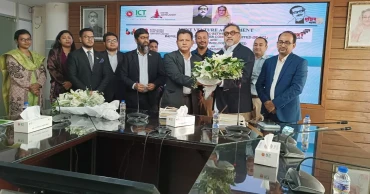
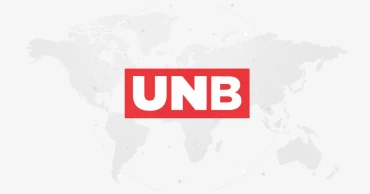
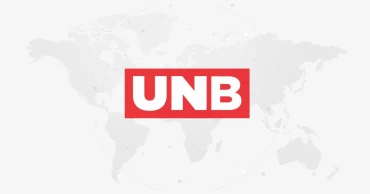
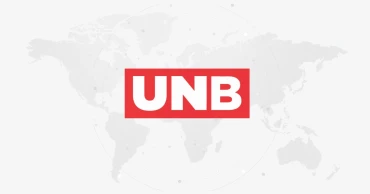

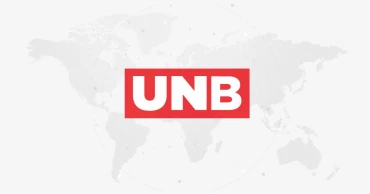
.jpg)
 (1).jpg)

.jpg)




